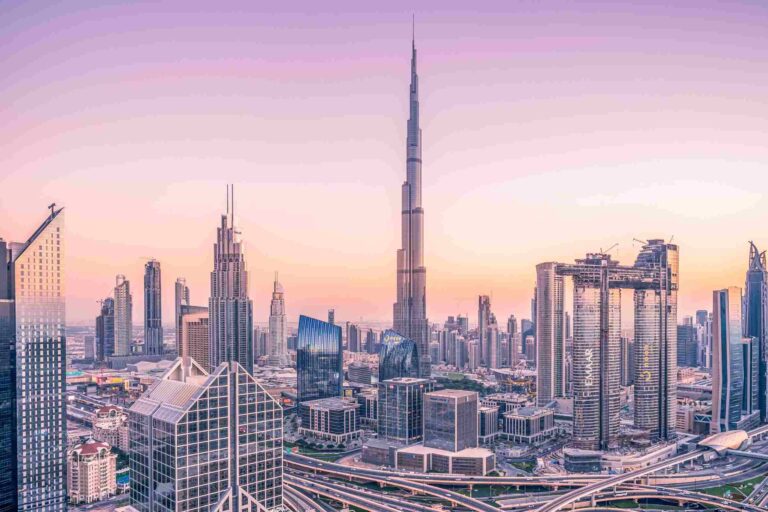Dubai is a global financial hub, hosting the major banking sector of the MEASA area and supporting pioneering solutions in the fields of fintech, artificial intelligence and blockchain.
Thus, making the city a magnet for investment in emerging sectors: from fintech, e-commerce, blockchain, to artificial intelligence and robotics.
Table of Contents
Dubai, a world of opportunities
Dubai offers a myriad of opportunities for potential future investors. The Middle East, Africa and South Asia (MEASA) region is home to over three billion people, ever-expanding mobile connectivity, and growing levels of trade and investment.
The MEASA area requires increasingly widespread and sophisticated financial services. Which represent an opportunity for innovative companies in the financial sector.
As trade and investment increase, so will the role of capital markets and wholesale banking transactions. These dynamics highlight the importance of Dubai on the chessboard, transforming it to all intents and purposes into a key hub among the main markets of the region. For this reason, more than $350 billion of trade takes place in Dubai every year.
A large part of the population lacks access to banking services and the potential for fintech products is vast. Thanks to continued growth, wholesale banking and capital markets will become ever more important. And Dubai’s position as a global commercial hub ensures the city pole position.
Dubai’s role as a financial hub between East and West
DIFC bridges the time zone gap between the world’s most advanced financial centers of London and New York in the West and between Hong Kong and Tokyo in the East, as well as facilitating the flow of trade and investment along the Southern Economic Corridor.
The Center will triple in size by 2024 and establish a world-class financial destination by deepening and broadening impact for global members and industries, and by investing in innovation.
Ensuring the best regulatory and judicial framework around, DIFC is comprised of the Dubai Financial Services Authority (DFSA) and the legal bodies of the Dubai Courts, the DIFC Tribunals and two arbitration centres, the DIFC LCIA (London Court of International Arbitration) and the DIAC (Dubai International Arbitration Center).
Thriving banking and business sector
DIFC is home to 17 of the world’s top 20 banks. Also, 7 of the best law firms and 13 of the world’s most prestigious asset management firms.
It is the preferred regional hub for some of the world’s most reputable banking institutions. Including Barclays, Citibank, HSBC and Standard Chartered, all of which operate a total of 85 branches in the city.
Additionally, credit card giants Visa and MasterCard are also based in Dubai.
Room for growth potential of financial services
In the Middle East, Africa and South Asia, 86%, 66% and 46% of adults respectively do not have traditional bank accounts. In South Asia, only 55% of men and 37% of women have bank accounts.
Particularly, young people find it difficult to access banking services. In sub-Saharan Africa, young people hold $2.2 billion in savings. And half of that amount is in the hands of people living on less than $2 a day.
Smartphone use is also rapidly on the rise. 33% of the population of sub-Saharan Africa uses devices and this number is expected to double by 2025.
Opportunities for investors and venture capitalists
Dubai has the highest number of investors and venture capitalists in the region. Crowdfunding platforms and low-cost portfolio products have expanded investment. Also giving the opportunity to invest to middle- and lower-middle income citizens.
Growth in the supply of credit, a growing interest in private equity and an increase in venture capital are also helping to drive the development of the middle market.
Dubai-based venture capitals are also contributing to the fintech boom. Wamda Capital, founded in 2014 and one of the busiest in the UAE, has invested $17.4 million in financial products website YallaCompare. And also launched a $100 million fund called WamdaX. BECO Capital has expanded its exposure to fintech, investing $3.5 million in insurance site Bayzat.
The future of fintechs
As technology transforms the way financial transactions are executed and completed, Dubai is taking the lead in the region’s fintech sector with a diverse range of start-ups deciding to operate in the city. In the Middle East and North Africa alone, fintech startups have raised more than $100 million in funding over the past decade.
Dubai is currently considered one of the top ten fintech hubs in the world and number one in the region. DIFC is at the forefront of the city’s innovative ecosystem and is well positioned to drive growth.
One of these initiatives is a low-cost innovation license. Proposed to technology enablers, it is aimed at companies that fall under FinTech, RegTech, InsureTech. But also other SMEs interested in developing or testing new, original or innovative products.
E-commerce market
One sector with huge growth potential in Dubai is the e-commerce market. With a value in the UAE alone expected to reach $27.2 billion.
A series of government reforms and measures to stimulate the growth are set to push the UAE’s gross domestic product past the $500 billion mark in the coming years.
Artificial intelligence, robotics and blockchain
Dubai ranked first globally in attracting foreign direct investment (FDI) in artificial intelligence, robotics and blockchain. Recording $21.6 billion in FDI in high-end technology transfers between 2015 and 2018. Most of which came from the European Union and the United States, respectively 5.7 billion and 3.9 billion dollars.
Aiming to attract investment in technology, including robotics and artificial intelligence, Dubai is ideally positioned in the heart of the MEASA region to lead the fintech and blockchain revolution.
Read also: Le Fonti Global Awards, the eagerly awaited international format restarts from Dubai












